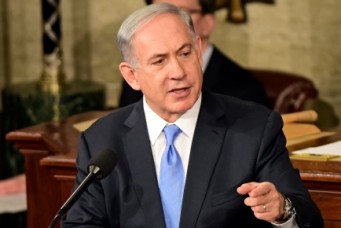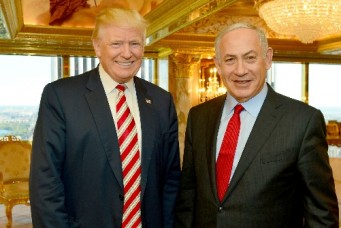Netanyahu and the Iranian Threat
Some say Israeli Prime Minister Benjamin Netanyahu is obsessed with the Iranian nuclear issue; others say he just cares deeply about it. Jewish history influences the leader’s policies today.

A youth praying in front of the Wailing Wall, Jersualem, 20 December 2013. Andre Pain/Corbis.
Some say Israeli Prime Minister Benjamin Netanyahu is obsessed with the Iranian nuclear issue. Some say he just cares deeply about it. Whatever the case, the feeling draws on the historical passions of many others, including Netanyahu’s own father.
Benzion Netanyahu, a history professor, tutored his son on his own life’s work, an encyclopedic history of the Spanish Inquisition. In 1492, with the Reconquista of Spain from Muslim rulers, King Ferdinand and Queen Isabella embarked on a campaign to expel Jews from the country. For centuries, Spain had been the world’s leading center of Jewish life and host to a celebrated coexistence among Jews, Christians, and Muslims. But Ferdinand and Isabella unraveled that coexistence. Spain’s Jews were banished, penniless, to Amsterdam or Salonika, or else faced the torture chambers of the vicious Tomas de Torquemada.
Benzion Netanyahu wrote a nearly 1,400-page book on the Spanish Inquisition and its narrative of deceit and hostility toward the Jews. The choice of research topic was no coincidence. The elder Netanyahu was a disciple of Vladimir Jabotinsky, founder of the school of Zionism that birthed, eventually, Israel’s Likud party.
Jabotinsky advocated a Jewish polity that would seek, unapologetically, maximalist territorial goals and stand proudly in the face of the inevitable international opposition and local resistance. For Zionists from the Left, anti-Semitism was a curse of being stateless, to be cured once Jews were sovereign in their own land and normalized among the peoples of the earth. For Jabotinsky and the elder Netanyahu, nothing would cure Jew-hatred. The only option was for Jews to stand steadfast against it. The goyim hated the Jews, and they always would. What mattered was the resilience of Jewish fortitude.
In 1937, Jabotinsky visited Warsaw to speak to the city’s Jews. “Liquidate the diaspora,” he told them, “or the diaspora will liquidate you.” The message: Jews should leave at once for the Land of Israel, or else lie exposed to a hostility that could one day boil over. Jabotinsky’s words were not met with great enthusiasm. Yet, by 1945, most of those in the room likely were dead. Of Poland’s 3.3 million Jews, 90 percent were massacred in the Holocaust. Again, history had confirmed the dark prophecies of Jabotinsky’s—and Benzion Netanyahu’s—worldview.
This outlook is hardly one held by only Jabotinsky, Benzion, or Benjamin Netanyahu. It resonates throughout much of Israeli society and the Jewish diaspora. Nearly every Jew—whatever their own family tree—bears personal stories of persecution in their own family tree. Beyond the Holocaust, these stories may draw from as far back as the Spanish Inquisition or as recent as the mid-century pogroms of the Arab World, or the anti-Semitism of the Soviet Union that continued well into the 1980s. This history of persecution continues to animate Israeli politics.
Benjamin Netanyahu has found a ready audience for his worldview—and has been elected three times by Israeli voters. Netanyahu is not Barack Obama. He believes that human nature is rotten: the Palestinians will not make peace with a Jewish state; the Arab Spring will be won by the extremists; and the Iranian regime will build a nuclear bomb and leverage it to try to destroy the Jewish commonwealth.
That latter threat has consumed Netanyahu. On almost all issues—economic reform, religion and state, even the West Bank—Netanyahu has shown flexibility for the paramount goal of personal political survival. But the question of Iran’s nuclear program is an issue above political considerations. For that, it seems, Netanyahu would even give up the acclaim of the prime ministership. This, he believes, is the issue of our time. Other foes, whether Arab nationalism or jihadism, may menace Israel. Yet today, none has similar momentum or capabilities to the Iranian regime. The specter of a Palestinian demographic majority between the river and the sea preoccupies much of Israel’s establishment, given the potential consequences for the state’s character. But Netanyahu believes, rightly or wrongly, that the status quo can be managed. The march of the Iranian regime, on the other hand, must be broken.
The complexity, in history and today, is that the Iranian people are not the enemy. Jewish tradition views the ancient Persians—in contrast to the Egyptians, Babylonians, Greeks, or Romans—as relatively benign. The Persian ruler, Cyrus, permitted Jewish exiles to return from Babylon to rebuild the Temple in Jerusalem. In the Book of Esther, a tale of Jewish salvation from annihilation by a Persian monarch, the story’s chief villain, Haman, is, according to Jewish tradition, not even Persian but Amalekite, part of a mythical nation that will pursue the Jews until the end of days. In the ancient text, the Persians may be decadent and gullible, but unlike the Amalekite Haman they are not hostile, and even show tolerance in running their multinational empire.
In modern times, too, Israel and Iran enjoyed warm diplomatic and people-to-people relations before the Islamic Revolution in 1979. An older generation of Israelis, particularly those with Iranian family roots, remembers the country fondly. Relations between Jews and Palestinians have been toxic for nearly a century. In contrast, some Israelis’ attitudes toward Iran are more like those of Americans toward Cuba: nostalgia for a long-lost past and regret about the politics that cut short the cultural connections.
Still, there are points where Jabotinsky and Netanyahu’s reading of history meets reality—and confirms Jews’ worst fears. For more than three decades, the Islamic Republic’s leaders have paraded their followers through the streets with shouts of “Death to Israel!” They have stomped Israeli flags and rolled missiles through streets as part of demonstrations against Israel. Motivations for this anti-Israel speech are both ideological and cynical. Ideologically, the revolution’s leaders viewed Israel as an illegitimate affront to the Muslim collective. Cynically, hostility toward Israel serves the geopolitical needs of the Iranian regime, which seeks a position of power in the Arab World. It helps the regime bolster its soft power among an Arab public hostile to the Jewish state.
The regime’s hostility is not just limited to words; it’s propped up non-state proxy groups like Hezbollah and Hamas along Israel’s borders. The umbrella of a nuclear-armed Iran might allow these groups to make further gains and cause greater suffering to Israelis and many others in the Levant. Of course, Israelis also face the risk that the Iranian regime would actually attack Israeli cities with nuclear bombs. This is what social scientists call a “low-probability, high-impact event.” In all likelihood, Israel could deter or destroy an incoming nuclear missile. But, if not, the impact would be cataclysmic. For this reason, whatever the likelihood of an apocalyptic scenario, Israeli policymakers like Netanyahu treat it seriously. To date, that thinking has not led Netanyahu, ever risk-averse about military engagement, to pursue a strike on Iran. But Israel has not been shy in the past: in 1981, the government led a strike on an Iraqi nuclear reactor, and is allegedly responsible for a 2007 strike on a reactor in Syria.
The nature of the Iran deal requires trust: trust in the Iranian regime to comply, and trust in the international community to enforce. Netanyahu, along with many Israelis, trusts neither.
Both the Hebrew Bible and Jewish tradition teach that the Jews are “a people that dwells alone.” Zionism originated, in part, to temper this sense of powerlessness. Sovereignty has supplied a sense of efficacy lost for centuries. Still, the sense of isolation persists, as Zionism runs up against its geopolitical limits. Israel is a small country, and the Jews a small people. Unlike Americans, Europeans, or Arabs, Israelis cannot count on civilizational allies on a Huntingtonian map.
It is simplistic to embrace the Benzion Netanyahu narrative in its entirety, and dangerous to apply it crudely to the Iranian nuclear issue. But the opposite is no wiser. Israel must survive in a world where hostile parties—that will always be present in some measure—have greater access to catastrophic means, including nuclear weapons. However obsessive Netanyahu’s views on Iran, the realities of Jewish history and Israeli geopolitics cannot be dismissed.
A version of this article originally appeared on June 30, 2015.
Owen Alterman is a research fellow at the Institute for National Security Studies in Tel Aviv.
Subscribe to Our Newsletter





